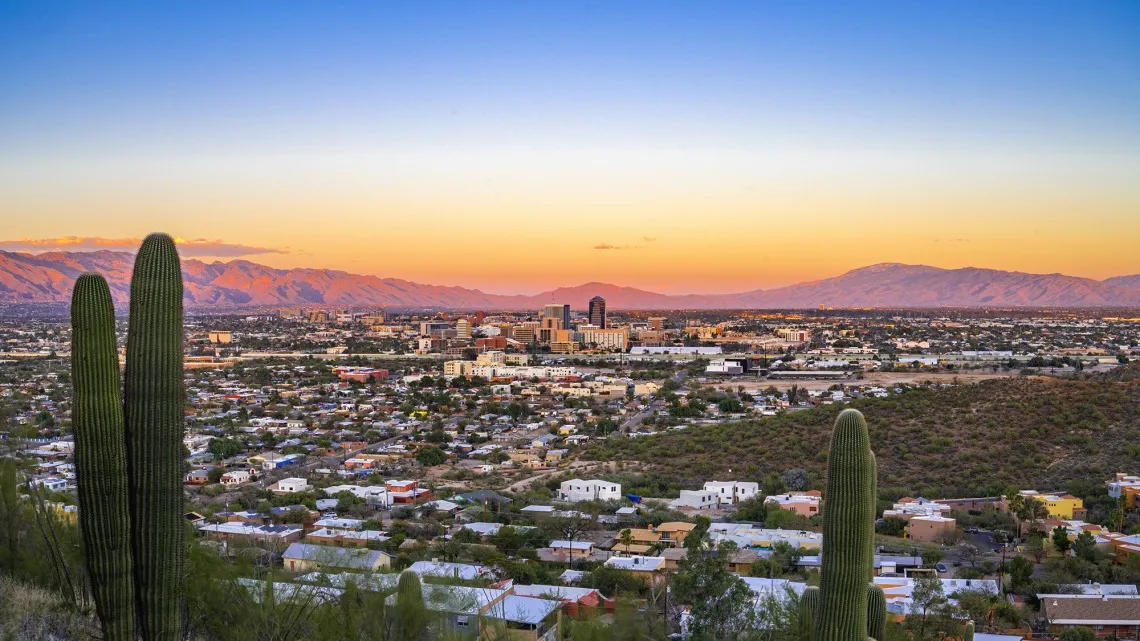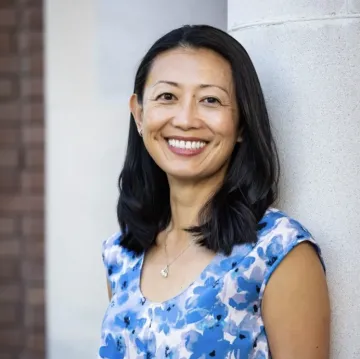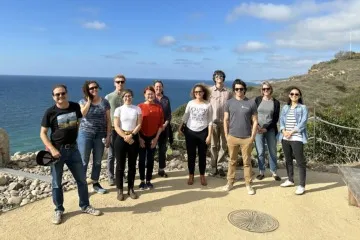AIR Center Awarded $7.4M for Its Work on Climate Adaptation Solutions

An aerial view of Tucson.
Following an open competition, the University of Arizona has been selected to continue its work as host institution for the Southwest Climate Adaptation Science Center. The center, part of the university's Arizona Institute for Resilience, also received $7.4 million from the U.S. Geological Survey to help fund practical solutions to high-priority climate adaptation needs.
The Southwest Climate Adaptation Science Center is a collaborative partnership with the U.S. Geological Survey and seven academic institutions across the Southwest, including Northern Arizona University, Utah State University, the University of Nevada, Las Vegas, UCLA, University of California San Diego/Scripps Institution of Oceanography and the University of California, Davis.

Jia Hu
The host institution is selected through a competitive process. The university's proposal – prepared by Jia Hu – an associate professor in the School of Natural Resources and the Environment and assistant dean for graduate education in the College of Agriculture, Life and Environmental Sciences – outlined the center's mission to conduct solution-oriented science.
"What I'm really excited about is the type of science that we'll do, which is what we call 'engaged and actionable science' with community members," said Hu, who serves as director of the center. "We identify partners from the very beginning, and this ensures that the science we conduct is not only usable but is provided in a format that the stakeholder can actually use it in."
Decision-makers and scientists working together
In 2009, a secretarial order to address the impact of climate shifts on America's water, land and other natural resources was issued by the Department of the Interior. The order established eight Climate Science Centers across the U.S. for the purpose of supporting adaptation efforts on public and private lands.
Pursuant to the secretarial order, the Southwest Climate Adaptation Science Center was established in 2011 as a federal-university partnership to "co-produce" science, a process in which scientists and decision-makers work together to produce user-driven, solution-oriented research. The center also works closely with members of the community and tribal leaders.

Southwest Climate Adaptation Science Center partners came together to write a proposal focused on building the center's capacity. The center is a collaborative partnership with the U.S. Geological Survey and seven academic institutions across the Southwest.
Courtesy of Jia Hu
"The Southwest Climate Adaptation Science Center is well-positioned to address the climate needs of the tribes," said Hopi farmer Michael Kotutwa Johnson, a faculty member in the School of Natural Resources and the Environment as well as the Indigenous Resilience Center in AIR. He credits working with leadership across universities for the ability to help tribes with their climate needs.
"The University of Arizona is a leader in climate science and climate solutions at a time when climate change-related issues are among the most pressing challenges we face as a society," said University of Arizona President Robert C. Robbins. "The work being done by the Southwest Climate Adaptation Science Center will have real, critical impact on people's lives, especially those living in the desert Southwest."
The Southwest is an ecologically diverse region, home to deserts, mountains, forests and coastlines, and has some of the most iconic plants and wildlife in the U.S. As the hottest and driest area in the country, the Southwest is particularly vulnerable to rising temperatures, leading to challenges such as increased flooding and extreme wildfires. Land and resource managers need the latest research to stay prepared for current and future challenges.
"I'm thrilled that we'll be able to provide real-world solutions for those who need it the most, and for that, we're going to need a well-funded research center," said Elise Gornish, an ecological restoration extension specialist with Arizona Cooperative Extension and director of AIR's Desert Laboratory on Tumamoc Hill. "That's what the Southwest Climate Adaptation Science Center is. We've got the necessary tools and we're really excited. Jia is really going to take us to the next level."
Hu joined the center as director in January 2023. Previously, Gregg Garfin, professor of climate science and policy and director of science translation and outreach for the AIR, served as director for five years.
"Dr. Hu is the right person, at the right time and place, to guide the SW CASC in the next phase of its evolution toward being an innovator and trusted partner in climate adaptation scholarship and next-gen education," Garfin said. "The SW CASC third-phase vision created by Dr. Hu and her partners shows strong promise of moving the needle on natural resource management practice, environmental justice and the coupling of Western science and Indigenous knowledges."

